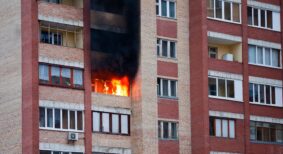Despite the vast new potential pool of recreational cannabis users, tenants and condominium owners with medical authorization to grow and consume cannabis may still trigger some of the most contentious debates in multi-residential buildings. Landlords and condo corporations have options to prohibit or control smoking within units, while Canada’s Cannabis Act, coming into force on October 17, limits cultivation for personal use to a maximum of four plants per household. However, residents with medical authorization will remain largely exempt from those conditions.
Rental housing industry advocates have been urging the Canadian government to review and modify rules for the quantity and/or growing locales of plants that medical users are currently allowed to cultivate. This formula is based on the number of plants deemed necessary to yield a patient’s prescribed daily dosage with few accompanying guidelines beyond some recommended safety and security measures.
“In one case, I have seen a Health Canada registration certificate authorizing up to 49 cannabis plants in an apartment unit with no requirement for consent from the landlord,” reports Joe Hoffer, a partner and specialist in municipal and tenancy law with Cohen Highley LLP. “I have seen what amounts to a full blown grow op with high-level lighting, humidity controls, tented areas of the floor duct-taped together and the parquet flooring lifted and scattered about.”
“It can lead to absurd situations,” concurs Hans Brouillette, director of public affairs with CORPIQ (Corporation des propriétaires immobiliers du Québec). “We recently heard from one of our members who had to contend with a tenant who was authorized by Health Canada to grow up to 244 cannabis plants for personal use.”
Quebec, along with Manitoba, is one of two Canadian provinces where it will be prohibited to cultivate recreational cannabis in any residence. Fines for doing so have been set at $250 to $750 in Quebec and $2,542 in Manitoba, although both provincial stipulations contravene federal legislation and are vulnerable to a court challenge.
Setting terms for in-suite cultivation
Regardless, Hoffer advises that landlords and condo boards should still have room to manoeuvre. In most cases, residents will have other medical cannabis supply options so a prohibition on growing it in their homes would not obstruct their access to the product. Additionally, medical users’ rights have to be balanced against those of their neighbours.
“In my view, it would be an abdication of duty of care for landlords to permit grow ops in a multi-residential setting because they have to protect the property, health and safety of all residents,” he submits. “Fire and mould threats — and also security issues, in the case of 49 plants sitting there tempting miscreants — warrant imposing a rule.”
Alternatively, landlords can employ special lease conditions for circumstances in which they must accommodate plant cultivation on a larger scale.
“They should have a set of terms and conditions in place, usually implemented via an amendment to the tenancy agreement,” Hoffer says. “For example, that would require the tenant to have proper liability insurance with coverage for damage from grow operations, and indemnify the landlord for any damage caused. It should also cover compliance with property standards and environmental regulations, permission for regulatory officials to inspect and reimbursement for the cost of any environmental compliance orders.”
In the new recreational regime, he predicts landlords and condo boards will respond with varying degrees of discretion if residents overstep limits — either the four-plant ceiling in the Cannabis Act or a total embargo imposed through lease agreements or condo bylaws — for in-suite cultivation.
“Start with a letter telling them to cease the operation,” Hoffer says. “If there is no compliance, you can issue an N5 (to notify termination of tenancy) in an apartment context or threaten a court proceeding in a condo context.”
Nevertheless, rule breakers may be difficult to detect. Property managers will be able to inspect units, after giving advance notice, if there is a lease term or condo bylaw in place to prohibit cultivation. Otherwise, rental housing landlords would have the opportunity to check during annual or semi-annual unit inspections. Officials authorized to enforce the Cannabis Act — typically government inspectors or police — can only enter a dwelling unit with the resident’s consent or a warrant.
Moving smokers outdoors
Multi-residential dwellers with medical authorization to smoke cannabis could stand out from their neighbours simply by staying inside, since they will be exempt from any ban on smoking in units. In contrast, both Quebec legislation and Ontario’s Bill 36, the Cannabis Statute Law Amendment Act, which is now progressing toward adoption, effectively push most residents of non-smoking buildings outdoors if they want to light up — where they will have to stay at least nine metres away from any premises where smoking is prohibited.
Beginning with the October 17 legalization date, Quebec landlords will have 90 days, until January 15, 2019, to invoke a cannabis smoking ban in tenants’ units. Notably, the newly elected Coalition Avenir Québec (CAQ) government is on record supporting CORPIQ’s position that tenants who claim exempt status should be required to provide their landlords with documented proof of their medical prescriptions. The former Liberal government had rejected that proposal as an invasion of privacy.
Nearly half of the respondents to a June 2018 CORPIQ survey allow tobacco smoking in their buildings, but only 14 per cent of that group intend to be similarly lenient about cannabis. Recent communications in the September 2018 issue of the association’s publication, PROPRIO, reminds members they must consider all tenants even while accommodating medical cannabis users. That includes a legal opinion predicting the provincial tenancy regulator, la Régie du logement, will be called upon to mediate.
“In theory, even if a tenant obtains the right to smoke cannabis for medical reasons, he or she should not cause problems for the building’s other tenants,” reasons Damarys Pineda Machado, a lawyer with Gagnon & Associés Avocats. “If the owner notes that the tenant is disturbing other tenants’ peaceful enjoyment, the owner must send a formal notice to the tenant concerned. The owner could also suggest alternatives to smoking cannabis, such as using it in edible form, which would eliminate the second-hand smoke and resolve the complaint.”
CORPIQ will host seven educational seminars — six in French; one in English — in Quebec’s six largest cities between October 9 and 24 to explore details of the provincial and federal legislation that affect housing providers.
Health and safety vigilance
Adults will be allowed to smoke cannabis in almost every area of Quebec and Ontario where tobacco cigarettes are permitted. How that translates to multi-residential living will become more apparent in the days, weeks and months after October 17.
Fire safety experts note that balconies, doors and windows will be the primary exit and entry points for smoke and/or pungent odours since smoke cannot travel through fire separations between units. It’s plausible to expect formerly covert cannabis smokers will have an atmospheric impact, but that might happen somewhere outdoors in the prescribed range for smokers at least nine metres from any building entrance.
“Some people who were previously hiding it inside their suites might now be smoking it on their balconies,” hypothesizes Michele Farley, president and senior code consultant with FCS Fire Consulting Services Ltd. “However, if you consider the experience with tobacco, it seems like fewer people are smoking in their units.”
She suggests property managers may want to step up vigilance in common areas where smoking of any kind has long been prohibited. In particular, some buildings are already plagued with scofflaws smoking tobacco in the stairwells.
“I guess the question is, how much worse is this going to get?” Farley muses. “It’s also a good time to remind people that butts of any kind should never be thrown from a balcony.”
Barbara Carss is editor-in-chief of Canadian Property Management.





